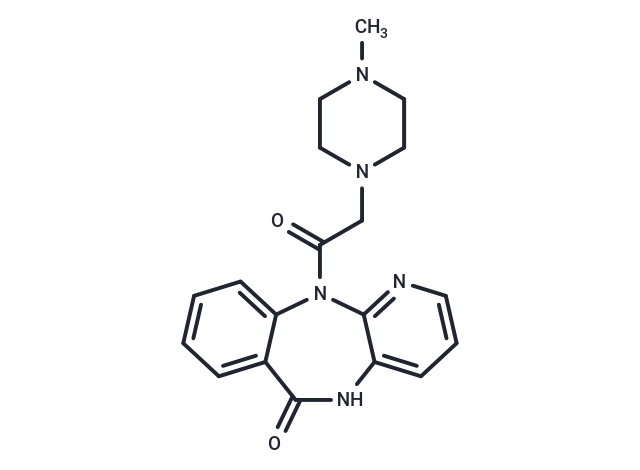Shopping Cart
- Remove All
 Your shopping cart is currently empty
Your shopping cart is currently empty

Pirenzepine (LS 519 free base) is a selective antagonist of the M1 muscarinic acetylcholine receptor (mAChR) that effectively inhibits gastric acid secretion and reduces muscle spasm, making it valuable for investigating peptic ulcers. Additionally, Pirenzepine exhibits anti-proliferative activity against cancer cells [1] [2].

| Pack Size | Price | Availability | Quantity |
|---|---|---|---|
| 25 mg | $1,520 | 6-8 weeks | |
| 50 mg | $1,980 | 6-8 weeks | |
| 100 mg | $2,500 | 6-8 weeks |
| Description | Pirenzepine (LS 519 free base) is a selective antagonist of the M1 muscarinic acetylcholine receptor (mAChR) that effectively inhibits gastric acid secretion and reduces muscle spasm, making it valuable for investigating peptic ulcers. Additionally, Pirenzepine exhibits anti-proliferative activity against cancer cells [1] [2]. |
| In vitro | Pirenzepine, administered at concentrations ranging from 100 to 140 μg/mL for a duration of 24 hours, effectively inhibits the proliferation of PC-3 cells. Furthermore, at a concentration of 110 μg/mL over the same time period, it suppresses migration in both prostate and lung cancer cells. The compound also decreases GLI1 expression in PC-3 cells when applied between 100 to 130 μg/mL across varying durations up to 24 hours. Detailed assays confirm Pirenzepine's action: In cell proliferation assays, it restricts the growth of PC-3 cells in a concentration-dependent manner; cell migration assays exhibit its ability to prevent the movement of PC-3 and A549 cell lines; and biochemical analysis reveals its inhibition of GLI1 and PTCH1 protein expression. RT-PCR data further supports the downregulation of GLI1 mRNA, a modulation of PTCH1 mRNA that did not achieve statistical significance, and no alteration in SHH mRNA expression, firmly establishing Pirenzepine's multifaceted inhibitory effects on cancer cell functionalities. |
| In vivo | Pirenzepine treatment, administered as a single intraperitoneal injection at a dosage of 0.3 mg/kg, demonstrates advantageous effects in mitigating lipopolysaccharide (LPS)-induced septic shock in male C57BL/6 mice suffering from experimental endotoxemia. This treatment not only improved the survival rate in the context of LPS-induced septic shock but also alleviated pulmonary and hepatic injuries associated with the condition. Furthermore, it significantly reduced the expression of suppressor of cytokine signaling 3 (SOCS3) at the mRNA level. |
| Molecular Weight | 351.4 |
| Formula | C19H21N5O2 |
| Cas No. | 28797-61-7 |
| Storage | Powder: -20°C for 3 years | In solvent: -80°C for 1 year | Shipping with blue ice. |

Copyright © 2015-2025 TargetMol Chemicals Inc. All Rights Reserved.